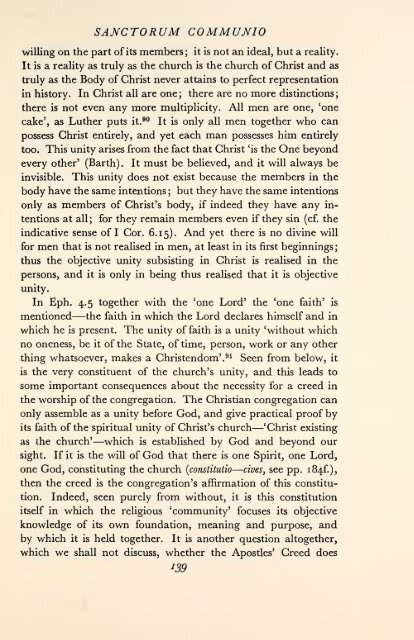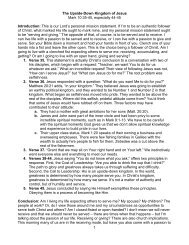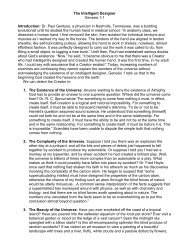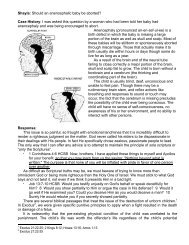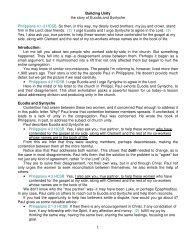Communion of saints
Communion of saints
Communion of saints
Create successful ePaper yourself
Turn your PDF publications into a flip-book with our unique Google optimized e-Paper software.
SANCTORUM COMMUNIO<br />
willing on the part <strong>of</strong> its members; it is not an ideal, but a reality.<br />
It is a reality as truly as the church is the church <strong>of</strong> Christ and as<br />
truly as the Body <strong>of</strong> Christ never attains to perfect representation<br />
in history. In Christ all are one ; there are no more distinctions<br />
there is not even any more multiplicity. All men are one, 'one<br />
cake', as Luther puts it. 90 It is only all men together who can<br />
possess Christ entirely, and yet each man possesses him entirely<br />
too.<br />
This unity arises from the fact that Christ 'is the One beyond<br />
every other' (Barth). It must be believed, and it will always be<br />
invisible.<br />
This unity does not exist because the members in the<br />
body have the same intentions ;<br />
but they have the same intentions<br />
only as members <strong>of</strong> Christ's body, if indeed they have any intentions<br />
at all ; for they remain members even if they sin (cf. the<br />
indicative sense <strong>of</strong> I Cor. 6.15). And yet there is no divine will<br />
for men that is not realised in men, at least in its first beginnings<br />
thus the objective unity subsisting in Christ is realised in the<br />
persons, and it is only in being thus realised that it is objective<br />
unity.<br />
In Eph. 4.5 together with the 'one Lord' the 'one faith' is<br />
mentioned—the faith in which the Lord declares himself and in<br />
which he is present. The unity <strong>of</strong> faith is a unity 'without which<br />
no oneness, be it <strong>of</strong> the State, <strong>of</strong> time, person, work or any other<br />
thing whatsoever, makes a Christendom'. 91<br />
Seen from below, it<br />
is the very constituent <strong>of</strong> the church's unity, and this leads to<br />
some important consequences about the necessity for a creed in<br />
the worship <strong>of</strong> the congregation. The Christian congregation can<br />
only assemble as a unity before God, and give practical pro<strong>of</strong> by<br />
its faith <strong>of</strong> the spiritual unity <strong>of</strong> Christ's church— 'Christ existing<br />
as the church'—which is established by God and beyond our<br />
sight. If it is the will <strong>of</strong> God that there is one Spirit, one Lord,<br />
one God, constituting the church (constitutio— cives, see pp. i84f.),<br />
then the creed is the congregation's affirmation <strong>of</strong> this constitution.<br />
Indeed, seen purely from without, it is this constitution<br />
itself in which the religious 'community' focuses its objective<br />
knowledge <strong>of</strong> its own foundation, meaning and purpose, and<br />
by which it is held together. It is another question altogether,<br />
which we shall not discuss, whether the Apostles' Creed does<br />
139


